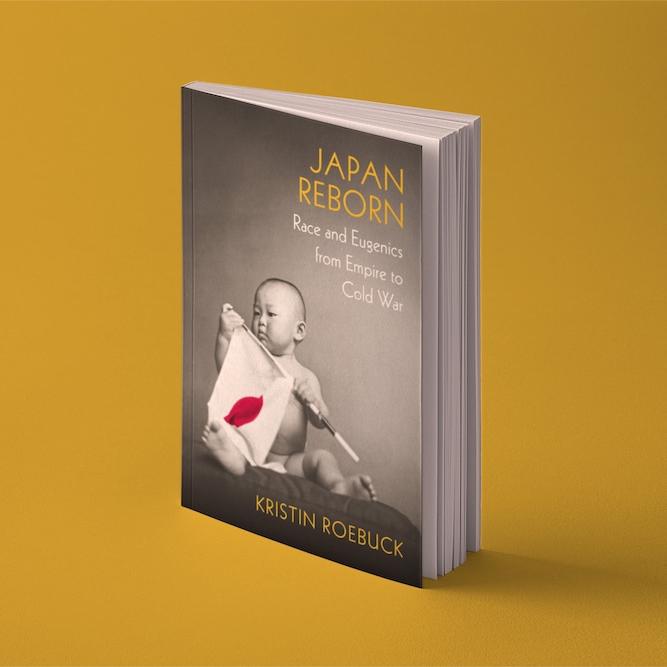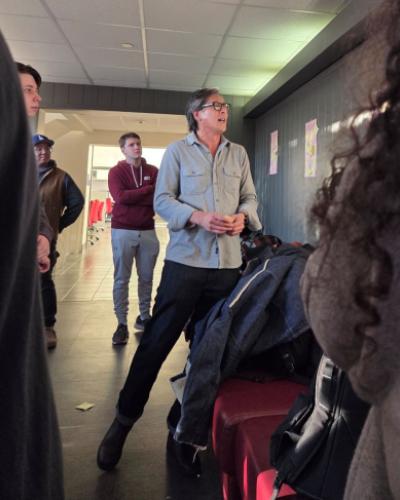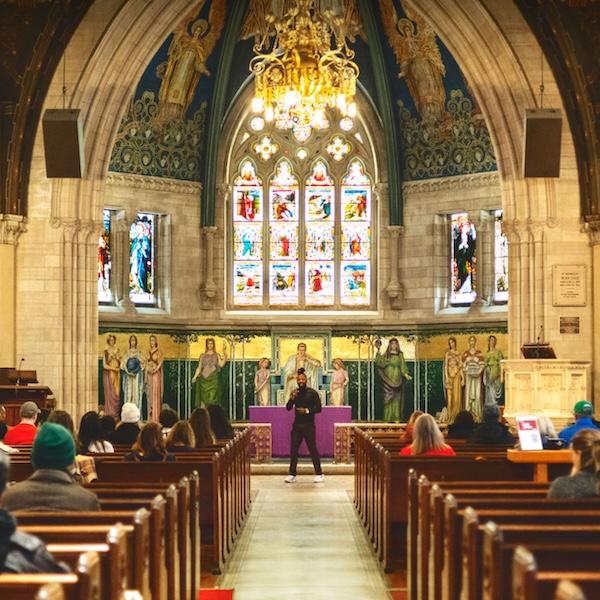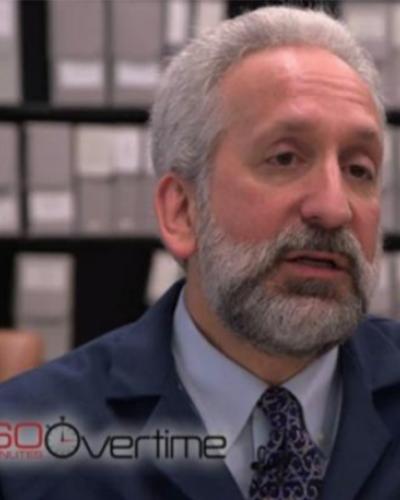Diplomatic Records Archivist Receives Foreign Policy Prize
This article was written by Miriam Kleiman of the National Archives News and reprinted here with permission.
As archivists go, senior archivist David Langbart is straight from central casting: serious, intellectually curious, erudite, bespectacled and bearded, with a razor-sharp knowledge of the records and a wicked, dry sense of humor.
Recently, the Society for Historians of American Foreign Relations (SHAFR) awarded Langbart its first-ever Anna K. Nelson Prize in Archival Excellence. “For historians of U.S. foreign relations, archivists are unsung heroes. By honoring David Langbart today with the Anna Nelson Prize, SHAFR takes a small yet significant and long overdue step toward correcting this oversight,” according to the organization’s official statement.
Langbart has worked at the National Archives for 44 years, but his interest in diplomatic history dates back to high school. His passion changed to potential vocation when he secured a spot in diplomatic historian Walter LaFeber's Cornell University Freshman Seminar. LaFeber, who became his adviser and friend, left a lasting influence.
As a college student, Langbart started as a National Archives intern in1977 and immediately fell under the spell of doing archival work. He returned the subsequent summers and was hired permanently to work with diplomatic records upon graduation. In the early years of his career, he worked with records of the Department of Justice, the Department of State, and the Department of the Army. He later joined the records appraisal staff, where he worked with the Department of State, Central Intelligence Agency, National Security Agency, National Reconnaissance Office, and Executive Office of the President, among other agencies, and appraised the records of the 9/11 Commission. Early career highlights included helping close out the Watergate Special Prosecution office and providing support for the congressional investigation of the record of the assassination of President John F. Kennedy. Since 2008, Langbart has brought his foreign affairs and intelligence knowledge to all aspects of the Research Services program.
Langbart’s approach to his archival work is reminiscent of Sherlock Holmes—he follows the clues in and on the documents and in the footnotes and uses his deep knowledge of the records to help researchers locate files. His work often involves going into the stacks, opening boxes, and searching through thousands of pages of records. The documents range from parchment to onionskin, loose pages, and volumes bound not only with glue but hand-stitched or even bound with nails.
In addition to sharing his expertise with diplomats and scholars, he regularly highlights his findings via Text Message blog posts, described by SHAFR as “informative, insightful, and fascinating.” Langbart’s blog topics span from the battle of Waterloo to the Space Age, sharing records on personalities including Hal Holbrook as Mark Twain, poet/writer E. E. Cummings, jazz musician Dave Brubeck, famed aviator Chuck Yeager, and comedian-actor-director Mike Nichols. Other topics have included foreign policy aspects of Apollo 11 and the demise of Skylab, “MAD Magazine and the Royal Family,” the advent of daylight saving time, and even several posts revealing humor in the government. His posts have also included descriptions and guides to records to assist researchers with their work. These posts are read and often republished on policy and history-related websites but have also been included in more mainstream media including Vanity Fair (origins of the “Dissent Channel” of the State Department) and Slate (How to Employ Women in Government Jobs: Postwar Advice).
The SHAFR award is the latest achievement in his career at the National Archives. While most of Langbart’s work is behind the scenes, one example of his stellar research skills made international headlines. Langbart saw a 60 Minutes story about Sir Nicholas Winton, a London stockbroker who saved hundreds of Jewish Czech children from the Nazis during World War II. Reportedly, Winton had reached out to President Roosevelt, asking that the United States take in some of the children, but the letter was presumed lost. After some archival sleuthing, in what was later called a “stunning discovery,” Langbart found the letter, blogged about it for The Text Message, and then was interviewed by 60 Minutes, The New York Times, and The Guardian (UK). Sir Winton, then 104 years old, saw his letter for the first time in 75 years.
Over the years, Langbart stayed close to his former Cornell professor LaFeber (who passed away in March). LaFeber thanked Langbart in his book "The Clash: U.S.-Japanese Relations Throughout History" and recognized him as “unsurpassed in his knowledge of the documents and in his determination to make them legitimately available for researchers.”
Langbart’s love of history extends far beyond work. His late father, Joseph Langbart, left his studies at Cornell University to fight in World War II. He was in the 99th Infantry Division and fought in the Battle of the Bulge. While Joseph shared few war stories, he did save artifacts. Ever the archivist, David recognized their value and after his father’s death, donated his father’s Army overcoat (modified for civilian use) and an A-2 Model flying jacket to the Cornell Fashion + Textile Collection. He is the caretaker of his father’s wartime correspondence and was surprised to find his father in the records—at work—see A Personal Prologue.
Langbart is the co-author of Unlocking the Files of the FBI, the first comprehensive guide to FBI records, and was the winner of the Society for the History in the Federal Government’s Thomas Jefferson Prize in 1994. He’s a longtime advocate of battlefield preservation in the United States. He is a significant contributor to the American Battlefield Trust and sits on the board of directors of the Save Historic Antietam Foundation.
Given Langbart’s background and ongoing work as a diplomatic records archivist, SHAFR Historical Documentation Committee Chair Professor Richard H. Immerman noted that Langbart was the unanimous choice of the selection committee, which, Immerman wrote to Archivist of the United States David S. Ferriero, “could not have been more effusive in its praise of David’s accomplishments and his contributions to the members’ collective scholarship. He stands alone for his devotion and his subject matter expertise.”
SHAFR established the prize in 2020 to honor Anna K. Nelson, professor of history at George Washington University and tireless advocate for making governmental records available to the public and scholarly communities. Nelson was a member of the National Study Commission on Records and Documents of Federal Officials established in the wake of President Nixon’s resignation. She helped write the commission’s report, which prompted passage of the Presidential Records Act. She also served on the American Historical Association’s Research Division and the Department of State’s Advisory Committee on Historical Diplomatic Documentation, and President Bill Clinton appointed her to the John F. Kennedy Assassination Records Review Board. The prize, awarded biannually at the SHAFR conference, honors an archivist who has demonstrated both exemplary expertise as well as outstanding and dedicated service over time to U.S. foreign relations and international history scholars.
“This award is a real honor, and the fact that it is named for Anna Nelson makes it even better. She set a high standard for archival research, promoting access, and excellence,” Langbart said.
During the COVID-19 pandemic, Langbart returned to the office to handle critical reference inquiries and volunteered to be one of the first employees to return to the office during phased reopening. He continued to blog and wrote posts highlighting diplomatic records about the 1918 influenza pandemic.





